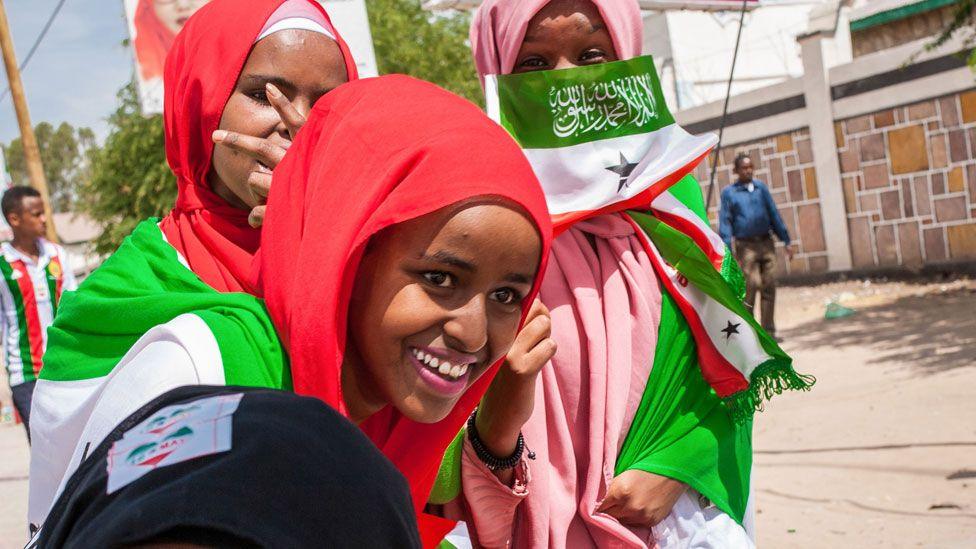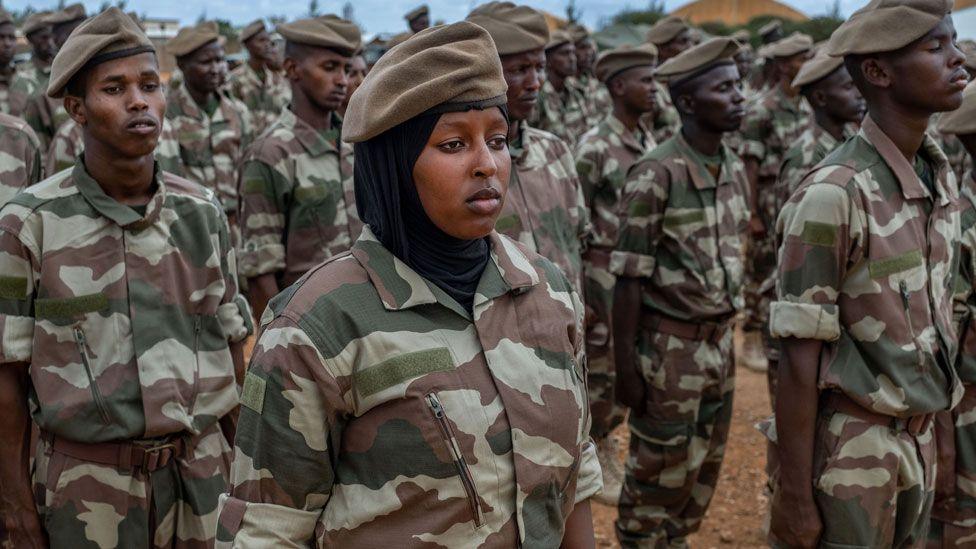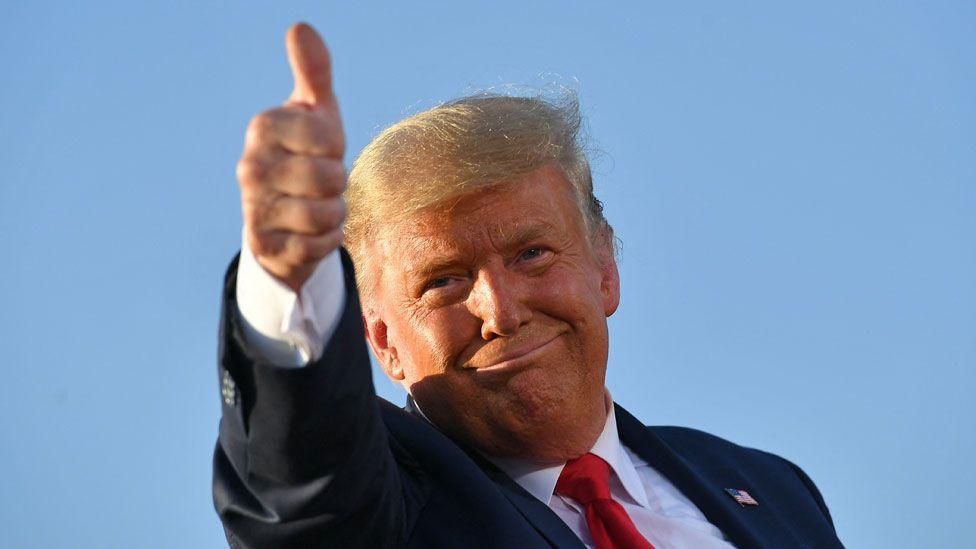The would-be African nation in love with Donald Trump

- Published
Many people in Somaliland are convinced that the United States, under the incoming presidency of Donald Trump, is poised to become the world's first country to recognise the self-declared republic.
The territory declared independence 33 years ago after Somalia descended into civil war - and in many ways has functioned as a de facto nation-state ever since.
"Donald is our saviour. He is a wise and practical man. God bless America," says university student Aisha Ismail, whose voice trembles with delight at the prospect.
She is speaking to me from Hargeisa, Somaliland's capital - a city 850km (530 miles) north of Mogadishu, the seat of Somalia's government.
For those in Mogadishu, Somaliland is an indivisible part of Somalia.
"I doubt Donald Trump knows what Somaliland is, never mind where it is," says Abdi Mohamud, a data analyst in Mogadishu, whose voice starts to shake.
"I am spitting fire."
He is so angry because Ms Ismail's great expectation is not necessarily a pipe dream, at least in the long term.
Powerful and influential Republicans are pushing for the same thing, including Congressman Scott Perry who last month introduced a bill proposing formal US recognition for Somaliland, external.
It followed the publication in April 2023 of Project 2025, external, a roadmap for the second Trump presidency compiled by the prominent right-wing Heritage Foundation and more than 100 other conservative organisations
The document mentions only two African territories in its sub-Saharan Africa section - Somaliland and Djibouti - and proposes "the recognition of Somaliland statehood as a hedge against the US's deteriorating position in Djibouti".
Any move towards recognising Somaliland's independence would not only contravene Somalia's sovereignty but also destabilise the region by setting a dangerous precedent"

However, the fact that sub-Saharan Africa takes up less than two pages in the 900-plus page plan suggests the continent is very low on the priority list.
Also, there is no guarantee the incoming administration will follow the blueprint, some of which Trump has already disavowed.
But one thing is clear. The US has already started to change its stance on Somaliland, moving away from its Mogadishu-focused approach, known as the "one-track" Somalia policy.
Somalia has cost the US dearly in financial, resource and human terms since the early 1990s when the bodies of 18 American servicemen were dragged through the streets of Mogadishu after US helicopters were shot down by Somali clan fighters.
The battle, known as "Black Hawk Down", was America's worst in terms of casualties since the Vietnam War.
"Any move towards recognising Somaliland's independence would not only contravene Somalia's sovereignty but also destabilise the region by setting a dangerous precedent," says Somali State Minister for Foreign Affairs Ali Mohamed Omar.
The African Union and other global powers believe territorial integrity is paramount. Recognising Somaliland could set off a chain reaction with separatists across the world demanding recognition for the territories they claim.
Omar also highlighted concerns about a possible repeat of the first Trump administration's decision to withdraw from Somalia most American troops who have been fighting al-Shabab, regularly described as al-Qaeda's most successful affiliate.
Under Joe Biden's presidency about 500 US troops have been stationed in Somalia - carrying out special operations and training an elite Somali force, Danab, which means "Lightning" and has proved more effective than the regular Somali army at rooting out al-Shabab.
The Americans have an airbase at Baledogle, north-west of Mogadishu, and conduct regular airstrikes against Islamist insurgents.
"A withdrawal would create a significant security vacuum, emboldening terrorist groups and threatening the stability of not only Somalia but the broader Horn of Africa," Omar warned.

The US has been training members of Somalia's elite Danab brigade to take on Islamist militants
The minister's remarks are in a similar vein but more measured than Somalia's response to a deal between Somaliland and Ethiopia whereby recognition would reportedly be granted in exchange for sea access.
I received late-night calls from Somalis who said they were unable to sleep over the controversial proposal.
Somalia's then-Environment Minister Aden Ibrahim Aw Hirsi told me at the time: "You are always going on about 'political bombshells' in your reporting.
"People here are talking about a political earthquake. This is far more serious. It is a tsunami."
Turkey has since mediated an end to the feud but the fact that Somalia recently signed a $600,000 (£492,000) a year deal with top Washington lobbying firm, the BGR Group, suggests it is worried about relations with the incoming Trump administration.
The US last month abstained from voting on a UN Security Council resolution, external to fund the latest incarnation of the African Union intervention force in Somalia.
A key architect of Republican Africa thinking, especially when it comes to Somali issues, is Joshua Meservey, who recently moved from the Heritage Foundation to the right-leaning Hudson Institute.
"The case for Somaliland in US terms is very compelling," he argues. "I think the question of recognition will definitely be discussed, although the guiding north star is what is best for US national interests in practical terms."
Senior Africa officials under Trump mark one, including the former Assistant Secretary of State for African Affairs, Tibor Nagy, and Africa envoy, Peter Pham, are energetic supporters of Somaliland's independence.
Like many American Republicans, Somaliland's Foreign Minister Abdirahman Dahir Adan sees the relationship in transactional terms.
"If the deal is good for us, we will take it. If the US wants a military base here we will give it to them."
Recognition sympathisers argue that Somaliland is located at the site of several converging US interests - economic, military and strategic.
Mr Meservey adds that the territory should be "rewarded" for adhering to democratic principles, not relying on foreign aid and having a small government.
Its long coastline runs along one of the world's busiest shipping lanes.
Yemen's Iranian-backed Houthi rebels may have replaced Somali pirates as the main disruptor of traffic in the area but the attacks remain a major threat to global trade and draw the region closer to the war in the Middle East.
The scramble for foreign bases along the Horn of Africa's coast is of concern to the US, which established its largest military facility on the continent in Djibouti in 2002.
Russia has its eyes on Port Sudan; the United Arab Emirates (UAE) used Eritrea's Assab to fight the Houthis and Djibouti is chock-a-block with foreign forces, including the Chinese, who not only have a well-placed military facility but also run the huge port.
Turkey's largest base on foreign soil stretches along Somalia's coastline just south of Mogadishu.
Dealing with a rising China is a top Trump priority.
The US has accused the Chinese of interfering with its activities in Djibouti by shining lasers into the eyes of its air force pilots and is keen to move elsewhere.
It also wants to disrupt China's Belt and Road Initiative, which is taking over much of Africa.
The Red Sea port of Berbera, whether you see it as part of Somaliland or Somalia, has much to offer as an alternative.
China is not there; indeed it is outraged that Taiwan in 2020 established diplomatic relations with the breakaway republic.
The UAE, a key US ally, runs the recently expanded port and hopes it will rival Djibouti.
During the Biden administration, top American officials, including the chief of US Africa Command (Africom), conducted site visits of Berbera, which has a 4km runway ironically constructed by the Soviet Union during the Cold War.
This was later identified by the US as an emergency landing site for space shuttles - interesting given Trump's ally Elon Musk's obsession with space.
In 2022, the US National Defence Authorisation Act was amended to include Somaliland, enhancing security co-operation and potentially paving the way for stronger diplomatic and economic ties.

Donald Trump may be enticed to recognise Somaliland if he sees a good business deal in it
Pro-recognition Republicans have presented Somaliland as a good business case, hoping to appeal to Trump's deal-making approach. Project 2025 used the term "hedge".
A US-based Somaliland diplomat said: "It depends how they sell it to him. They have to make it attractive; they have to seduce him."
Whether he means it or not, bringing up the explosive issue of recognition would likely suit Trump the disruptor.
It would certainly bring him attention and he could boast about being first.
It would also enrage Somalia, a country he included in his reported 2018 list of "shithole" nations and a place to which he wants to deport undocumented Somalis, failed asylum seekers and criminals.
There is already talk in Somaliland that the territory will be used as a "dumping ground" for such people in exchange for US recognition.
US academic Ken Menkhaus, who has followed Somali issues for decades, brings much-needed balance to the debate.
"It is very likely we will see significant shifts in US policy towards Somaliland and Somalia," he says.
"Mr Trump has a deep suspicion of foreign aid, is sceptical about state-building and is a neo-isolationist."
The Horn of Africa needs to be braced for change.

Mary Harper has written two books about Somalia, including Everything You Have Told Me Is True, a look at life under al-Shabab.
You may also be interested in:

Go to BBCAfrica.com, external for more news from the African continent.
Follow us on Twitter @BBCAfrica, external, on Facebook at BBC Africa, external or on Instagram at bbcafrica, external